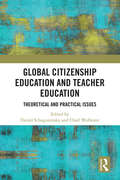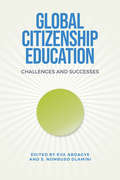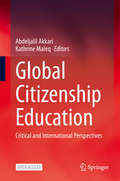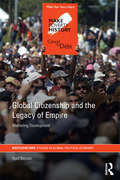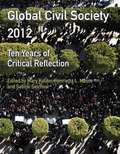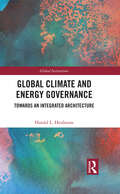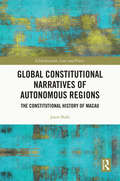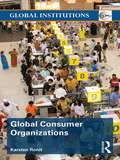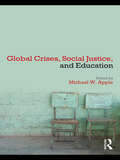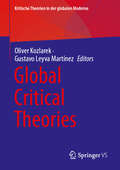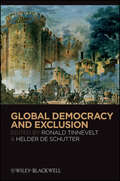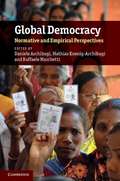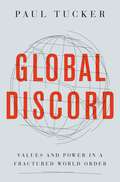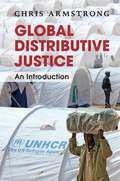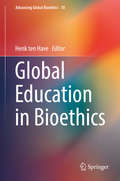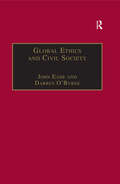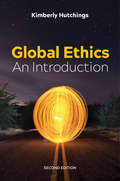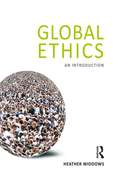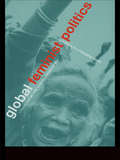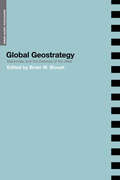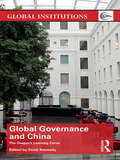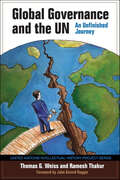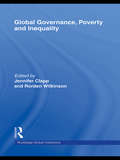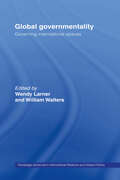- Table View
- List View
Global Citizenship Education in Teacher Education: Theoretical and Practical Issues (Critical Global Citizenship Education)
by Daniel Schugurensky Charl WolhuterGlobal Citizenship Education and Teacher Education brings together scholars and practitioners from all continents to explore the role of teacher education in formulating a practice of citizenship that has a global scope and is guided by critical and emancipatory approaches. By considering educational responses to global challenges —such as global warming, rising levels of inequalities, intensification of armed conflicts, growing streams of international migration, and the impact of neoliberal policies—this book provides valuable analyses for researchers, teacher educators, and educators. The volume examines historical and conceptual issues relating to the incorporation of global citizenship education in teacher education, and presents examples from across the world that showcase main trends in research and practice from across the world. This book is of great interest to graduate and postgraduate students, researchers, and libraries in the fields of citizenship education, global education, teacher education, international and comparative education, and education policy and politics.
Global Citizenship Education: Challenges and Successes
by Aboagye And DlaminiThe idea of citizenship and conceptions of what it means to be a good citizen has evolved over time. On the one hand, good citizenship entails the ability to live with others in diverse societies, and to promote a common set of values of acceptance, human rights, and democracy. On the other hand, in order to compete in the global economy, nations require a more innovative, autonomous, inventive, and reflective workforce, meaning good citizens are also those who successfully participate in the economic development of themselves and their country. At the same time, supporting citizens to realize their responsibilities beyond the nation has become important in this rapidly changing and interconnected world. These competing citizenship purposes often compel people to either ignore or act ambivalent to democratic and human rights values. That is, profit-driven labor exploitation, for instance, contradicts human rights and democratic tenants. Thus, global citizenship education is fundamental to teaching, learning and redressing sociopolitical, economic and environmental exploitation, globally. Detailing its historical development to be recognized as a field of study, Global Citizenship Education provides a critical discourse on global citizenship education (GCE). Authors in this collection offer underpinnings of global citizenship education by discussing its contemporary theories and methodologies, and specific case studies that illustrate the application of GCE initiatives. Aboagye and Dlamini aim to motivate learners and educators in post-secondary institutions not only to understand the issues of social and economic inequality, political and civil unrest facing us, but also to take action that will lead to equitable change in local and global spaces.
Global Citizenship Education: Critical and International Perspectives
by Abdeljalil Akkari Kathrine MaleqThis open access book takes a critical and international perspective to the mainstreaming of the Global Citizenship Concept and analyses the key issues regarding global citizenship education across the world. In that respect, it addresses a pressing need to provide further conceptual input and to open global citizenship agendas to diversity and indigeneity. Social and political changes brought by globalisation, migration and technological advances of the 21st century have generated a rise in the popularity of the utopian and philosophical idea of global citizenship. In response to the challenges of today’s globalised and interconnected world, such as inequality, human rights violations and poverty, global citizenship education has been invoked as a means of preparing youth for an inclusive and sustainable world. In recent years, the development of global citizenship education and the building of students’ global citizenship competencies have become a focal point in global agendas for education, international educational assessments and international organisations. However, the concept of global citizenship education still remains highly contested and subject to multiple interpretations, and its operationalisation in national educational policies proves to be challenging. This volume aims to contribute to the debate, question the relevancy of global citizenship education’s policy objectives and to enhance understanding of local perspectives, ideologies, conceptions and issues related to citizenship education on a local, national and global level. To this end, the book provides a comprehensive and geographically based overview of the challenges citizenship education faces in a rapidly changing global world through the lens of diversity and inclusiveness.
Global Citizenship and the Legacy of Empire: Marketing Development (RIPE Series in Global Political Economy)
by April BiccumThis book investigates the parallels between mainstream development discourse and colonial discourse as theorized in the work of Homi Bhabha, Gayatri Spivak and Edward Said. Aiming to repoliticize post-colonial theory by applying its understandings to contemporary political discourses, author April Biccum critically examines the ways in which development in its current form has recently begun to be promoted among the metropolitan public. Biccum contends that what has begun is a sustained marketing campaign for development that is a repetition, augmentation and ultimately much greater success of the work of the Empire Marketing Board of 1926. Demonstrating how this marketing campaign for development attempts to facilitate support for neo-liberal globalization, Biccum contends that this theatre of legitimation is emerging in response to growing critical voices and counter-hegemonic activity on the international stage. Featuring in depth analyses of the UK, cultural values, DfID, the commemoration of the slave trade and campaigns including Live8 and Make Poverty History, this book will be of interest to students and scholars of postcolonial studies, development studies, and international political economy. It will also offer insights valuable to a wider range of subjects including critical theory and globalization studies.
Global Civil Society 2012
by Mary Kaldor Henrietta L. Moore Sabine SelchowActivists and academics look back over ten years of 'politics from below', and ask whether it is merely the critical gaze upon the concept that has changed or whether there is something genuinely new about the way in which civil society is now operating. "
Global Climate and Energy Governance: Towards an Integrated Architecture (Global Institutions)
by Harald L. HeubaumTracing the changing activities of international bureaucracies active in global climate and energy governance, this book provides an in-depth analysis of processes of institutional innovation and governance integration between the two fields. It shows that rather than the consequence of a designed strategy, governance integration – the convergence of approaches and practices among different actors within one or between two or more governance architectures – has come as the result of organizational changes arising from the international bureaucracies’ various efforts to pursue and broaden their mandate in a complex and dynamic global policy environment. Each of the three cases analyzed (the UNFCCC Secretariat, the IEA Secretariat and the World Bank) began their life focused on particular activities that today, following periods of sustained organizational change, make up only part of their operations. Beyond creating greater synergies for cooperation across the governance architectures, improving policies, and mobilizing greater investment to tackle the climate emergency, the book shows governance integration to have contributed to preserving and expanding the role and relevance of all three international bureaucracies.This book will be of interest to students and scholars of global climate and energy governance, climate policy, and international organizations and their bureaucratic arms. Practitioners will find this book useful in thinking about why innovation in governance emerges and how it may be directed.
Global Constitutional Narratives of Autonomous Regions: The Constitutional History of Macau (Globalization: Law and Policy)
by Jason BuhiWith international attention focused on Hong Kong, many forget that Macau also exists in a delicate `one country, two systems’ (OCTS) balance with mainland China. This book provides insights into the circumstances surrounding the less-understood half of China’s OCTS policy, including the stagnation of representational government, and the location of any Macau characteristics in the Macau Basic Law. Despite being Hong Kong’s sister `Special Administrative Region’ (SAR) within the People’s Republic of China, Macau’s unique constitutional development under Portuguese and Chinese administration remains under-appreciated despite its potential contributions to local, national, and international constitutional discourse. Utilizing a multi-disciplinary approach including doctrinal, historical, and comparative methodologies, this work fills that gap. The research blends Portuguese, Chinese, and foreign-language sources in order to reconstruct a balanced constitutional narrative. The book focuses on a consequential effect of globalization – that is, the assimilation of a longstanding and unique constitutional order by a new hegemonic sovereign – including processes for internationalization as China opened up, legal harmonization of two distinct legal and socioeconomic orders, juridification of local affairs with the establishment of a new local court system in preparation for handover to the Chinese regime, and democratization (or the lack thereof) among the various communities comprising the Macanese polity before and since. Focusing on Macau’s unique development at the crux of European and Chinese empires, and the role it plays as a mirror for Chinese intentions vis-a-vis Hong Kong today, the book will be of interest to those working in Constitutional Law, Politics and History.
Global Consumer Organizations (Global Institutions)
by Karsten RonitAs corporate activity continues to expand in line with the continued globalization of the economy there is an increasing demand for establishing rules to regulate the trans-boundary activities of firms and their many and complex relations with consumers. Until now, sources of knowledge in this field have been scattered and unsystematic and this volume fills a key gap in current literature, providing a concise and accessible introduction to the role of global consumer organizations. The book: Provides an historical overview that traces the early attempts made before WWII to formulate elements of global consumer policy, highlighting key issues and initiatives up until the 1980s. Outlines the groups of organizations that are responsible for dealing with consumer issues in areas such as trade and development, socio-economics and the environment, including the Organisation for Economic Co-operation and Development, World Trade Organization, International Monetary Fund, United Nations Conference on Trade and Development, and World Bank. Analyses the group of special intergovernmental organizations that address the problems of specific consumer segments, industries and service-providers, including the World Health Organization, International Telecommunication Union and World Tourism Organization. Evaluates both current and future challenges and dilemmas facing consumer organizations, including addressing the continued issues of coordination between them. Providing a much-needed overview of this key area in international organization, Global Consumer Organizations will be of interest to students and scholars in a range of areas, including international political economy, consumer behaviour, international organizations, economic policy and consumer behaviour.
Global Crises, Social Justice, and Education
by Michael W. AppleEducation cannot be understood today without recognizing that nearly all educational policies and practices are strongly influenced by an increasingly integrated international economy. Reforms in one country have significant effects in others, just as immigration and population tides from one area to another have tremendous impacts on what counts as official knowledge and responsive and effective education. But what are the realities of these global crises that so many people are experiencing and how do their effects on education resonate throughout the world? Global Crises, Social Justice, and Education looks into the ways we understand globalization and education by getting specific about what committed educators can do to counter the relations of dominance and subordination around the world. From some of the world’s leading critical educators and activists, this timely new collection provides thorough and detailed analyses of four specific centers of global crisis: the United States, Japan, Israel/Palestine, and Mexico. Each chapter engages in a powerful and critical analysis of what exactly is occurring in these regions and counters with an equally compelling critical portrayal of the educational work being done to interrupt global dominance and subordination. Without settling for vague ideas or romantic slogans of hope, Global Crises, Social Justice, and Education offers real, concrete examples and strategies that will contribute to ongoing movements and counter-hegemonic struggles already active in education today.
Global Critical Theories (Kritische Theorien in der globalen Moderne)
by Oliver Kozlarek Gustavo Leyva MartínezToday, Critical Theory is no longer tied to a specific place in the world. Rather, genuine developments of Critical Theories can be observed in many academic contexts around the world. The contributions collected in this book show that the various projects of Critical Theory have not always and not exclusively emerged from the reception of the so-called Frankfurt School, but that the successful global expansion of capitalist modernity has triggered developments of Critical Theories in many parts of the world as an appropriate academic and intellectual endeavor of critique. Whether or not the tradition of the Frankfurt School is followed, Critical Theories are always about an undogmatic reading of Marxist theory, the critique of global capitalist modernity, the question of how this critique should be normatively grounded and how different academic disciplines should complement each other in a common endeavor of critical social and cultural research. The book provides an overview of debates and variants of critical theories in selected countries.
Global Democracy and Exclusion (Metaphilosophy #12)
by Ronald Tinnevelt Helder De SchutterThe essays in this book explore the consequences of globalization for democracy, covering issues which include whether democracy implies exclusion or borders, and whether it is possible to create a democracy on a global level. Explores the consequences of globalization for democracy Discusses whether democracy implies exclusion or boundaries Makes sense of democracy and human rights in a globalizing world Investigates what kind of common identity can and should support forms of global democracy Presents a state-of-the-art analysis of the foundations of global democracy
Global Democracy: Normative and Empirical Perspectives
by Daniele Archibugi Mathias Koenig-Archibugi Raffaele MarchettiDemocracy is increasingly seen as the only legitimate form of government, but few people would regard international relations as governed according to democratic principles. Can this lack of global democracy be justified? Which models of global politics should contemporary democrats endorse and which should they reject? What are the most promising pathways to global democratic change? To what extent does the extension of democracy from the national to the international level require a radical rethinking of what democratic institutions should be? This book answers these questions by providing a sustained dialogue between scholars of political theory, international law and empirical social science. By presenting a broad range of views by prominent scholars, it offers an in-depth analysis of one of the key challenges of our century: globalizing democracy and democratizing globalization.
Global Discord: Values and Power in a Fractured World Order
by Paul TuckerHow to sustain an international system of cooperation in the midst of geopolitical struggleCan the international economic and legal system survive today’s fractured geopolitics? Democracies are facing a drawn-out contest with authoritarian states that is entangling much of public policy with global security issues. In Global Discord, Paul Tucker lays out principles for a sustainable system of international cooperation, showing how democracies can deal with China and other illiberal states without sacrificing their deepest political values. Drawing on three decades as a central banker and regulator, Tucker applies these principles to the international monetary order, including the role of the U.S. dollar, trade and investment regimes, and the financial system.Combining history, economics, and political and legal philosophy, Tucker offers a new account of international relations. Rejecting intellectual traditions that go back to Hobbes, Kant, and Grotius, and deploying instead ideas from David Hume, Bernard Williams, and modern mechanism-design economists, Tucker describes a new kind of political realism that emphasizes power and interests without sidelining morality. Incentives must be aligned with values if institutions are to endure. The connecting tissue for a system of international cooperation, he writes, should be legitimacy, creating a world of concentric circles in which we cooperate more with those with whom we share the most and whom we fear the least.
Global Discord: Values and Power in a Fractured World Order
by Paul TuckerHow to sustain an international system of cooperation in the midst of geopolitical struggleCan the international economic and legal system survive today’s fractured geopolitics? Democracies are facing a drawn-out contest with authoritarian states that is entangling much of public policy with global security issues. In Global Discord, Paul Tucker lays out principles for a sustainable system of international cooperation, showing how democracies can deal with China and other illiberal states without sacrificing their deepest political values. Drawing on three decades as a central banker and regulator, Tucker applies these principles to the international monetary order, including the role of the U.S. dollar, trade and investment regimes, and the financial system.Combining history, economics, and political and legal philosophy, Tucker offers a new account of international relations. Rejecting intellectual traditions that go back to Hobbes, Kant, and Grotius, and deploying instead ideas from David Hume, Bernard Williams, and modern mechanism-design economists, Tucker describes a new kind of political realism that emphasizes power and interests without sidelining morality. Incentives must be aligned with values if institutions are to endure. The connecting tissue for a system of international cooperation, he writes, should be legitimacy, creating a world of concentric circles in which we cooperate more with those with whom we share the most and whom we fear the least.
Global Distributive Justice
by Chris ArmstrongGlobal distributive justice is now part of mainstream political debate. It incorporates issues that are now a familiar feature of the political landscape, such as global poverty, trade justice, aid to the developing world and debt cancellation. This is the first textbook to focus exclusively on issues of distributive justice on the global scale. It gives clear and up-to-date accounts of the major theories of global justice and spells out their significance for a series of important political issues, including climate change, international trade, human rights and migration. These issues are brought to life through the use of case studies, which emphasise the connection of theories of justice to contemporary politics, and 'Further Issues' sections, which discuss emerging debates or controversies that are likely to command increasing attention in the coming years.
Global Education in Bioethics: Challenges In Global Bioethics (Advancing Global Bioethics #10)
by Henk Ten HaveThis book presents and elaborates on how the teaching of global ethics in healthcare contributes to furthering ideals of cosmopolitanism: solidarity, equality, respect for differences and concern with what human beings, and specifically patients have in common, regardless of where they live and who they are. Global problems such as pandemic diseases, disasters, lack of care and medication, homelessness and displacement call for global responses. The new area of global bioethics is providing answers by arguing that ethical discourse should first of all criticize the structures of violence and injustice that underlie many threats to global health. Education of health professionals should articulate that they are ‘citizens of the world’, like their patients. This book first demonstrates that a moral vision of global education is necessary to gain a global dimension. It is argued that a global framework of ethical principles is available; the challenge is to elaborate and specify that framework into specific educational approaches and models. The book subsequently analyzes goals and challenges of global education in biomedicine and healthcare. It is shown how such challenges (e.g. inequities and cultural differences) can be overcome. Finally, the book presents concrete examples (cases, methods, and practices) of global education in bioethics. The unique feature of the book is that it addresses global education challenges specifically in the area of healthcare, medicine, and medical science. It combines two areas of research and experience that are usually not connected: global bioethics and global education. This book is written for all those involved in global ethics teaching in medicine, nursing, ethics, philosophy, law, and theology courses.
Global Ethics and Civil Society (Ethics and Global Politics)
by Darren O'ByrneThis detailed and timely volume examines the impact of global transformations on concepts of civil society. Divided into two sections, it evaluates changing notions of ethics and how these transformations are operationalized. The first part deals with the theoretical aspects while the second examines the practical impact of the evolution of global ethics and norms on society. Providing solid case studies, this accessible volume contributes to the theoretical literature in the field and will prove a useful library reference work or graduate reader in the areas of globalization, civil society, ethics, human rights, citizenship and cosmopolitanism.
Global Ethics: An Introduction
by Kimberly HutchingsThis revised edition of Kimberly Hutchings’s best-selling textbook provides an accessible introduction to the field of Global Ethics for students of politics, international relations and globalization. It offers an overview and assessment of key perspectives in Global Ethics and their implications for substantive moral issues in global politics. These include the morality of state and non-state violence, the obligations of rich to poor in a globalizing world, and the scope and nature of international human rights. The second edition contains expanded coverage of pressing contemporary issues relating to migration, changes in the technologies of war, and the global environment. Hutchings’s excellent book helps non-specialist students to understand the assumptions underpinning different moral traditions, and enables them to formulate their own views on how to approach moral judgement and prescription – essential in a world which, though it is shared by all, possesses massive cultural differences and inequalities of power.
Global Ethics: An Introduction (Routledge Handbooks In Applied Ethics Ser.)
by Heather WiddowsGlobal ethics addresses some of the most pressing ethical concerns today, including rogue states, torture, scarce resources, poverty, migration, consumption, global trade, medical tourism, and humanitarian intervention. It is both topical and important. How we resolve (or fail to resolve) the dilemmas of global ethics shapes how we understand ourselves, our relationships with each other and the social and political frameworks of governance now and into the future. This is seen most clearly in the case of climate change, where our actions now determine the environment our grandchildren will inherit, but it is also the case in other areas as our decisions about what it is permissible for humans beings to do to each other determines the type of beings we are. This book, suitable for course use, introduces students to the theory and practice of global ethics, ranging over issues in global governance and citizenship, poverty and development, war and terrorism, bioethics, environmental and climate ethics and gender justice.
Global Feminist Politics: Identities in a Changing World
by Suki Ali Kelly Coate Wangui Wa GoroGlobal Feminist Politics examines the changing global context for feminist political action, its meaning and forms. It acknowledges the existence of dissent and debate among feminists, asserting that such debate leads to innovation in theory and practice. This book reaches the conclusion that the future of the women's movement depends upon a dialogue which is unafraid to cut across perceived differences.Focusing on key issues raise by a feministic commitment to global political change, this book covers subjects including:* the relevance of contemporary feminist politics for younger women* gendered accounts of genocide and catastrophe* exile, migration and diaspora* gender and the internet* women and the nationalist movement in India* gender issues in Pakistan, Australia, South Africa and the Middle East.Featuring an international panel of cutting-edge feminist thinkers, Global Feminist Politics demonstrates the innovative work being undertaken in the academic and professional worlds, as well as in women's activism. It is an invaluable resource for students in Women's Studies and Development Studies, as well as all those interested in the development of contemporary global feminism.
Global Geostrategy: Mackinder and the Defence of the West (Geopolitical Theory)
by Brian W. BlouetThis is a new examination of Halford Mackinder’s seminal global geostrategic work, from the perspective of geography, diplomatic history, political science, international relations, imperial history, and the space age. Mackinder was a man ahead of his time. He foresaw many of the key strategic issues that came to dominate the twentieth century. Until the disintegration of the Soviet Union, western defence strategists feared that one power, or alliance, might come to dominate Eurasia. Admiral Mahan discussed this issue in The Problem of Asia (1900) but Mackinder made the most authoritative statement in "The Geographical Pivot of History" (1904). He argued that in the "closed Heart-Land of Euroasia" was a strategically placed region, with great resources, that if controlled by one force could be the basis of a World Empire. James Kurth, in Foreign Affairs, has commented that it has taken two World Wars and the Cold War to prevent Mackinder’s prophecy becoming reality. In World War I and World War II Germany achieved huge territorial gains at the expense of the Russian empire and the Soviet Union. In the former conflict the Russian empire was defeated by Germany but the western powers insisted that the territorial gains made by Germany, at the treaty of Brest-Litovsk, be given up. In World War II Britain and the US gave material support to Stalin’s totalitarian regime to prevent Nazi Germany gaining control of the territory and resources that might have been a basis for world domination. The west, highly conscious of Mackinder’s dictum (1919) that "Who rules East Europe commands the Heartland," quickly adopted policies to contain the Soviet Union. History has therefore proved Mackinder’s work to be of vital importance to generations of strategic thinking and he remains a key influence in the new millennium. This book will be of great interest to all students and scholars of strategic studies and military history and of geopolitics in particular.
Global Governance and China: The Dragon’s Learning Curve (Global Institutions)
by Scott KennedyThis volume offers systematic analysis of China’s growing engagement in global governance institutions over the past three decades. During this period, China has gone from outsider to observer to insider. The volume is based on studies of Chinese involvement in a wide cross section of regimes, including trade, finance, intellectual property rights, foreign aid, and climate change. The contributions show that China’s participation in global governance reflects the mutually interactive processes of China’s own socialization into the global community and the simultaneous adaptation of global institutions and actors to China’s growing activism. Both China and the international system are internally complex. Hence, Chinese engagement varies across economic regimes, yielding different results in terms of Chinese compliance, its influence on regimes, and the extent of cooperation and conflict in addressing challenges in international society. The chapters reveal that China is neither purely a savior nor scofflaw of the global economic system, and while China is a defender of the status quo in some areas, it is a reformer in others, and occasionally a revisionist in still other spheres. A detailed analysis of many areas of global governance, this volume will be essential reading for students and scholars of international relations, Chinese studies and global governance.
Global Governance and the UN: An Unfinished Journey (United Nations Intellectual History Project Series)
by Thomas G. Weiss Ramesh ThakurIn the 21st century, the world is faced with threats of global scale that cannot be confronted without collective action. Although global government as such does not exist, formal and informal institutions, practices, and initiatives—together forming "global governance"—bring a greater measure of predictability, stability, and order to trans-border issues than might be expected. Yet, there are significant gaps between many current global problems and available solutions. Thomas G. Weiss and Ramesh Thakur analyze the UN's role in addressing such knowledge, normative, policy, institutional, and compliance lapses. The UN's relationship to these five global governance gaps is explored through case studies of some of the most burning problems of our age, including terrorism, nuclear proliferation, humanitarian crises, development aid, climate change, human rights, and HIV/AIDS.
Global Governance, Poverty and Inequality (Global Institutions)
by Jennifer ClappA series of crises unfolded in the latter part of the first decade of the 21st Century which combined to exacerbate already profound conditions of global economic inequality and poverty in the world’s poorest countries. In 2007, the unsound lending practices that caused a collapse in the US housing market ushered in a broader economic crisis that reverberated throughout the global financial system. This economic shockwave had a global impact, triggering not just instability in other industrialized countries, but also in their developing world counterparts, also highlighting deficiencies in the current structures of global governance to protect the world’s poorest and most disadvantaged. This book offers answers to questions raised about the role of global governance in the attenuation and amelioration of world poverty and inequality. The contributors interrogate the role of systems of governance at a time of global economic crisis and continuing environmental degradation against a backdrop of acceleration in inequalities within and between communities and across the globe. Evaluating how existing systems can be reformed or redesigned to be more effective at addressing issues of poverty and inequality and providing a comprehensive discussion of a wide range of global governance initiatives this work will be essential reading for students and scholars of global governance, international relations and international organizations.
Global Governmentality: Governing International Spaces (Routledge Advances in International Relations and Global Politics #28)
by Wendy Larner William WaltersFoucault's thoughts on governmentality have made a significant impact on the studies of power and governance in modern societies. However, most studies of governmentality confine themselves to the exploration of power within nation-states. Global Governmentality extends Foucault's political thought towards international studies, exploring the governance of the global, the international, the regional and many other extra-domestic spaces.Combining historical and contemporary outlooks, this book offers innovative interdisciplinary explorations of such issues as international peacekeeping, refugees, political rationalities of security and neoliberalism, the spatiality of globalization, the genealogy of development, and the ethical governance of corporate activity.At a time when many of the geopolitical and economic certainties which framed international affairs are in flux, Global Governmentality is suggestive of new territories and lines for international analysis. It will be of interest to students and researchers of both governmentality and international studies.
